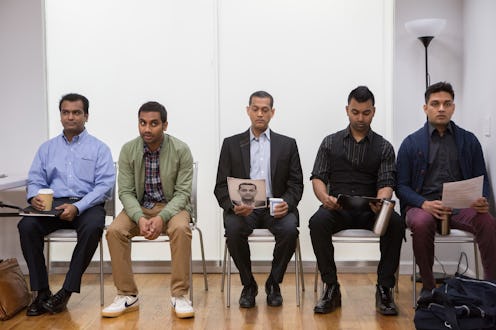Entertainment
'Master Of None' Season 2 May Reverse These Negative Stereotypes

Master of None is poised for a highly-anticipated return to Netflix following an immensely beloved first season in 2015. Of the many elements that made Aziz Ansari's first major solo television outing a success was the various ways in which he shed light on racial and diversity issues. For Ansari, a co-creator and co-writer on Master of None, removing insidious stereotypes about Asian men as romantic partners, friends, or even as they are perceived in the workplace was major. Now, in a recent New York Magazine profile, Ansari discussed changing Muslim representation on TV through Master of None. In breaking down those stereotypes even further, Ansari sounds like he hopes to level the playing field for Muslims on television and in real life.
"If every time you see a Muslim person, it’s the f*cking guy from 24 or Homeland, yeah, it’s going to shape your opinion of all these people," Ansari told New York Magazine. "If every time you saw a Muslim person on TV, and it’s my dad, you’ll be like, 'These goofy people! They’re probably gonna ask me for a bite of my sandwich.' I don’t think Islamophobic people have hate in their heart. I’m not saying it’s justified, but representation is part of the problem."
Ansari's apparent laser-focus to tear down the negative Muslim archetypes and imagery in television seems to come from a personal place. His parents are both Muslim Indian immigrants who came to the United States before Ansari was born. Growing up in South Carolina, Ansari's formative years (which he regularly incorporates into his stand-up) offered him a unique world view in regards to race, class, and the American attitude towards immigrants. To say that, through Master of None, he is committed to changing our minds seems to be an understatement.
When it came to Master of None touching on Indian- and Muslim-American representation, Ansari put his parents in the spotlight. Ansari's casting of his parents — primarily his father, Shoukath Ansari — was smart. Both his father and his mother were often used for situations not directly related to race (with the exception of the truly fantastic Season 1 episode "Parents," which touches on generational divides). Ansari's ability to simply incorporate his parents into the story without constantly drawing attention to their race was a masterful move; it's not unthinkable that this initiative could be part of Master of None Season 2.
Ansari's opportunity to really break down these stereotypes could pay dividends in the real world. While talking to New York Magazine, he discussed his opinions on the recent Muslim travel ban and how it affected him personally. "Just this whole treatment of immigrants like these second-class citizens, it’s very frustrating and hurtful. I just feel like, 'Oh, we're getting off on a technicality that my family just happens to be from India, and not one of these other countries where brown people are from.'" Ansari added that this feeling of safety extended to airports – for now. "I’m like the luckiest Muslim-born person. Everyone at Homeland Security knows who I am. They tell me they like my work."
While it's great to know that it seems Ansari feels at least somewhat shielded by fame, it's also important to note that he also seems to understand the real-world implications of these consistently negative stereotypes of Muslims in television. Viewers could correlate what they see on TV as pure fact and incorporate it into their treatment of Muslims in the real world. Ansari and Master of None could help alleviate these problems, even in a small way.
All I can say, with confidence, at this moment is that if Ansari continues to help end negative Muslim stereotypes in Master of None Season 2, then please sign me all the way up. We need more of that kind of energy on television right now.
Editor's Note: On Jan. 13, Ansari was accused of sexual misconduct by a woman who went on a date with him. Ansari has since responded to the claims, saying:
"In September of last year, I met a woman at a party. We exchanged numbers. We texted back and forth and eventually went on a date. We went out to dinner, and afterwards we ended up engaging in sexual activity, which by all indications was completely consensual.
The next day, I got a text from her saying that although 'it may have seemed okay,' upon further reflection, she felt uncomfortable. It was true that everything did seem okay to me, so when I heard that it was not the case for her, I was surprised and concerned. I took her words to heart and responded privately after taking the time to process what she had said.
I continue to support the movement that is happening in our culture. It is necessary and long overdue."